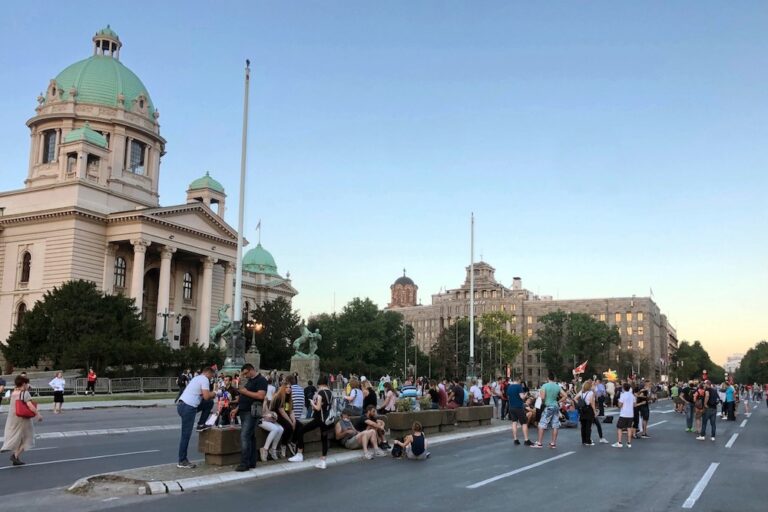(HRW/IFEX) – On 21 December 1998, Human Rights Watch condemned a new clampdown on the Internet in Serbia, part of a concerted effort by President Slobodan Milosevic to stifle free expression and academic freedom. The university administration’s order prevents students, professors, and researchers throughout Serbia from accessing a website from OpenNet, the Internet branch of […]
(HRW/IFEX) – On 21 December 1998, Human Rights Watch condemned a new
clampdown on the Internet in Serbia, part of a concerted effort by President
Slobodan
Milosevic to stifle free expression and academic freedom. The university
administration’s order prevents students, professors, and researchers
throughout Serbia from accessing a website from OpenNet, the Internet branch
of Belgrade’s independent Radio B92.
**Updates IFEX alerts of 9 December, 25 November, 10 November and 21 October
1998**
On 10 December, the new government-appointed dean of the School of
Electrical Engineering, Vlada Teodosic, ordered “filters” to prevent users
of the Yugoslav academic Internet network from accessing the OpenNet
website, a major source of independent news and information. The measure
also affects the independent media and non-governmental organisations in the
country, many of which access OpenNet through the university.
“OpenNet has played a central role in breaking the government’s information
blockade,” said Human Rights Watch academic freedom specialist Joseph
Saunders. “President Milosevic and his allies are spearheading a direct
assault on the free flow of information.”
The act of censorship comes as the latest step in an ongoing attack on the
universities by Yugoslav President Milosevic. In May 1998, a new university
law stripped Serbian universities of their autonomy and required all
professors to sign new contracts within sixty days regardless of the terms
of existing contracts and guarantees of tenure. Professors who refused to
sign the new contracts, viewed by many as loyalty oaths to the government,
have been harassed, suspended, and fired.
Teodosic, who has authority over the computing center at the University of
Belgrade, has been a central figure in academic repression. In October, he
suspended twelve engineering professors who refused to sign the new
“contracts,” including professors such as Branko Popovic, with nearly one
hundred and fifty publications to his name and awards from several
international scientific societies. Teodosic hired private security guards
to forcibly remove any of the twelve professors who attempted to return to
their classrooms.
The attack on the Internet also comes amidst increased government harassment
of the independent media in Serbia. A new Law on Information, passed on 20
October, established a system of prior censorship and imposes prohibitively
high fines on journalists, editors, and publishers; three newspapers have
been shut down thus far.
The immediate motive for blocking OpenNet access appears to have been a link
on the website to a political cartoon that showed Teodosic in a Nazi uniform
giving a Nazi salute. The cartoon also portrayed another newly-appointed
administrator, Milos Laban, as a monkey. The OpenNet site also hosts
detailed, regularly updated information on the conflict between academics
and the government, and includes letters of support for Serbian academic
freedom from academics and universities around the world (see:
www.hrw.org/hrw/press98/aug/serltr810.htm). For more information, visit the
OpenNet website at www.opennet.org


